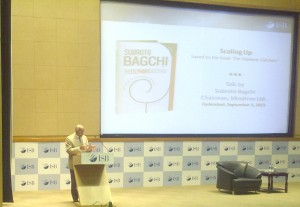Loading the Elevenlabs Text to Speech AudioNative Player...
Subrato Baghchi delivers an excellent talk around his new book “The Elephant Catchers”. Here is a brief capture and my comments in blue.
- Book premise: In India there is no framework for scale. And the book “The elephant catchers” is to provide the same with the help of case studies of companies that achieved it–ITC, Sugana (that has redefined supply chain to suit its business model), TVS, Aravind Eye hospital (that took the best practices from McDonalds), Hetero, Dr.Reddy’s Labs, LV Prasad eye institute (that chose to give away its innovative edge for the betterment of the nation by training more than 15,000 surgeons)
- Here the step wise framework proposed. Entrepreneur should
- Be comfortable with scale and treat it as his/her ally (This is the first and last stumbling block for many)
- Be willing to change the business model to change/evolve as per the new customer to be acquired even at the expense of losing/alienating the existing customer base. (Sometimes similar to ‘The Blue Ocean Strategy’) (Very difficult to do. For instance, a mass hero with strong domestic market pull, but who wants to cater to satellite TV market and overseas markets has to take some tough calls to re-define his customer proposition.)
- Scale his/her intellect; imagine a different future; imagine the new reality first in one’s head, sort of pre-empt. Important actions to achieve this could include broad basing the board with the right mix of individuals and go beyond family and friends; Hire people with different competencies; Use consultants before they outlive their purpose. (Consultants cease to be of unique value beyond six months-Azim Premji) (Coming from Mr.Premji, the No.1 no-nonsense business leader is worth considering seriously, who by the way, did employ some of the best brand consultants to change the perception of Wipro from a Vanaspathi selling company to that of solution selling)
- Scale one’s reputation (currency) or reputation capital: It is the reputation that saves a company in terms of crisis and forms an important part of its resilience (It depends on the size of crisis though, Mr.Raju proved this otherwise with his ‘riding the tiger’ pen-stroke, and all of a sudden Satyam (truth) was no longer what it stood for)
- Scale one’s people ( Most often founders end up occupying the key posts for long and become the glass ceiling for second in organizational chain. Founders should know when to let go. They should plan ahead of time) (Founders should devise an exit plan for themselves and not just for the company. They should believe in clock building as outlined in the book ‘Good to Great’. What stays behind and stands the test of time, is the true achievement. )
- Scale adversity. Should tide over crisis and stay put. For instance TVS group that weathered the uncertainty during the freedom struggle (Crisis and the company’s response defines the company’s character. There are lots of global examples like Johnson and Johnson, Toyota etc (pulling back bad products from the market and absorbing the losses)
Q&A related
- Quality is not defined by the customer. It is the company’s prerogative and planned ahead by the company. (Sales are just one indicator of customer’s perception of product’s quality)
- Small is beautiful when it is so good and world-class that scale cannot match it. The price of being small is excellence. Such companies should not scale. (Any thing that cannot be commodotized cannot be scaled? SVR cannot be scaled amongst actors?)
- Scaling of people has to be driven by the top management. Outside tools like business schools etc help, but nothing like nurturing individuals by spending white space non agenda time.
- If business is leading edge scaling is a must or they will be eaten away by the big players. Resource building has to be done in an unique fashion like makemytrip.com that raised money via NASDAQ listing instead of Indian bourses. What’s your story? Where does it have its most appeal? (Nothing new actually, SIFY, a brain child of Mr.Raju, was the first internet company do so. He was a master storyteller and super success, before we lost him to dark side.)
- Most often displacement (physical, emotional, intellectual) is the cause of entrepreneur’s success ( A hero becomes one, only when he leaves his base)
- Answer to a business problem may be outside the business
- Law is not substitute to character.
- Scale should be an all round, multi-level development. It cannot one mega scale but a zillion micro ‘scale’s
- Founder’s trap: Taking the trinity example, just imagine Lord Shiva doing Lord Vishnu’s work and vice-versa. How can a founder be expected to do everything at the level, scale demands? To let go is the most difficult thing for a successful founder (Core-competency)
- Innovation needs an ecosystem (Should respect research; Jugaad innovation is non-sense). Look beyond engineering. Look at themes that are defining the current human scape. Existential thinking

